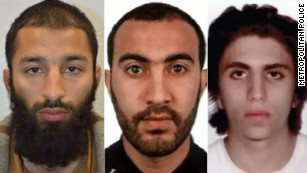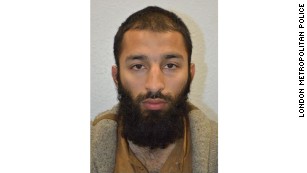London ringleader Khuram Butt was intensely investigated
London attack ringleader Khuram Butt was identified as a major potential threat, leading to an investigation that started in 2015, UK counterterrorism sources tell CNN.
British police and MI5 began investigating Butt intensively as part of a major drive to dismantle and destabilize al-Muhajiroun, a grouping of extremists in the UK supportive of ISIS, the sources told CNN.
Butt was seen as a heavyweight figure in al-Muhajiroun, whose hardline views made him potentially one of the most dangerous extremists in the UK, the sources said Tuesday. The investigation into Butt involved a "full package" of investigatory measures, the sources told CNN.
What we know about the London Bridge attackers
Among Butt's extremists contacts in the UK was a British al-Muhajiroun figure who helped organize training in Malakand, Pakistan, for some of those involved in a plot to bomb the UK in 2004 with fertilizer bombs and one of the 7/7 London bombers, according to the sources.
British counterterrorism officials moved more aggressively to take down al-Muhajiroun in 2014 after British extremists began to flock to Syria to join ISIS's newly declared caliphate. A significant proportion of the British foreign fighters reaching Syria had links to the group, according to the sources.
Police say Butt, 27, was one of three men who rammed a van into pedestrians on London Bridge before launching a stabbing spree in bars and restaurants at nearby Borough Market on Saturday night. All three were shot dead by police.
The assailants killed seven people and wounded 48 others.
Worries about an attack on British soil
After ISIS called for attacks in the West in September 2014, British security services grew increasingly concerned that al-Muhajiroun members who had remained in the UK would carry out terrorist attacks. One of those they were most concerned about was Butt, the sources said.
Al-Muhajiroun's roots in the UK date back to the 1990s, when it was founded by a Syrian cleric living in Tottenham named Omar Bakri Mohammed. When Bakri Mohammed was banned from the UK after the 2005 London bombings, Anjem Choudary, a British-Pakistani extremist with legal training, emerged as the group's leader in the UK.
In order to evade a series of bans by British authorities, al-Muhajiroun repeatedly changed its name, operating under a variety of guises including Shariah4UK and Muslims against Crusades. Despite openly whipping up support for al Qaeda and then ISIS amongst radical-leaning Muslims on the streets of London, Choudary's knowledge of British law allowed him to tailor his message to stay just on the right side of the law.
This made it difficult for British authorities to find grounds to charge him. Choudary's lieutenants, including Butt, were also careful in what they said in public and private.
UK police face questions as third London attacker named
The difficulty in building a case against al-Muhajiroun members was for years intensely frustrating to British counterterrorism officials, who were keenly aware of the effect proselytizers such as Choudary were having on a generation of young British Muslims, the sources told CNN.
Up to two-thirds of all terror plots involving UK nationals at home and overseas in the previous two decades had been linked to the group according to the sources, including the 2005 London bombings, the murder of British soldier Lee Rigby in east London in 2013 and a copycat plot in August 2014 to behead another British soldier in the capital.
Authorities scoured for any criminal behavior
Realizing a new strategy was necessary and increasingly worried by the growing threat from ISIS, British officials decided to take a zero tolerance approach to al-Muhajiroun. The new maxim was to take al-Muhajiroun members out of circulation by arresting them on whatever grounds could be found to get them off the streets.
One official involved in the effort described it as going after Al Capone for tax evasion. British counterrorrism investigators examined known supporters of ISIS to find even the smallest evidence of criminal behavior. These included traffic violations, minor fraud, and petty crime.
As part of the new proactive approach, police in London and other parts of the country arrested dozens of al-Muhajiroun members. Search warrants allowed them to search the premises and the computers of individuals British security services believed were potentially dangerous, as a result of information from their network of informants and the monitoring of social media.
In August 2015, British police arrested Choudary himself after the preacher slipped up by crossing the line and inciting support for a proscribed terrorist organization -- ISIS -- in lectures which were published online, as well as signing a document pledging allegiance to the group, also posted online. He was given a five-year prison sentence after a trial last year. Mohammed Rahman, another leading figure in the group, was charged and convicted of the same crimes.
London attack may have been planned only recently
"These men have stayed just within the law for many years, but there is no one within the counterterrorism world that has any doubts of the influence that they have had, the hate they have spread and the people that they have encouraged to join terrorist organizations," Commander Dean Haydon, head of the Metropolitan police's counterterrorism command said after the Choudary and Rahman verdicts.
British investigators believe Butt was the dominant figure in the plot to attack London Bridge and Borough market, the sources told CNN
British officials have said there was no intelligence as a result of their investigations into Butt to suggest that he was planning an attack and the investigation had been "prioritized accordingly." British security services had no inkling he was planning to attack on Saturday night, the sources told CNN. Investigators now believe Butt and his two co-conspirators only spent two to three weeks planning the attack, the sources told CNN.
The sources also told CNN:
-- The reason armed police were so quick to react to the attack was a mobile field unit of armed officers happened to be positioned nearby.
-- Investigators now believe Manchester attacker Salman Abedi likely built the bomb he set off at Manchester Arena last month. Investigators believe that given the power and relative sophistication of his device he likely received bombmaking training at some point in Libya. Twenty-two people were killed and dozens more injured after Ariana Grande's concert.
-- British authorities are worried more extremists in the UK will try carry out attacks in the next few weeks because of ISIS' calls to surge attacks during the Muslim holy month of Ramadan.
News Courtesy: www.cnn.com













